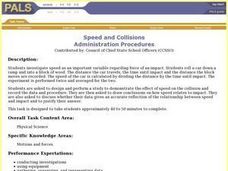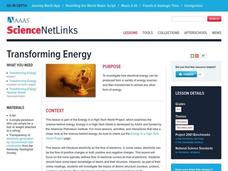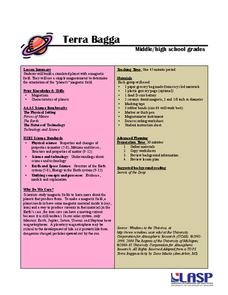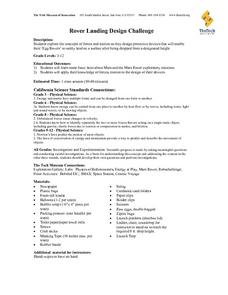Curated OER
Speed and Collisions Administration Procedures
High schoolers investigate speed as an important variable regarding force of an impact. Students roll a car down a ramp and into a block of wood. The distance the car travels, the time until impact and the distance the block moves are...
Curated OER
Action and Reaction
Students experiment with Newton's Third Law of Motion. In this physics and motion lesson, students complete two experiments to illustrate force and its equal and opposite reaction. Students first work in pairs to exert an equal force on...
Curated OER
Aeronautics: Bernoulli's Principle
Students explore physics by participating in a science activity in class. In this flight properties lesson, students identify Bernoulli's principle of flight and his theory of statics and motion. Students conduct a demonstration by...
Curated OER
Rolling Down Hill
Students perform an experiment, collect, and analyze data of a rolling marble down a ramp. They report results after they complete their experiment. Students are assessed in science and writing.
Curated OER
School House Rock! Science Rock
Middle schoolers use common household and classroom objects to generate static electricity and study its effects. They discuss the video Science Rock CD called Electricity, Electricity. The video explains many things about electricity.
Curated OER
Magnet Circus
Students explore the properties of magnets by designing a device that can move as far as possible using only magnets to move it, and design a machine that will stay in motion for the greatest period of time.
Physics Classroom
Action-Reaction Lab
Computer-interfaced motion detectors are required to carry out this inquiry. It is a new twist on exploring motion with plunger carts: they are set back-to-back and then propelled away from each other. Their velocities are measured, and...
Curated OER
Newton's Hat Trick
Young scholars are challenged to develop skits illustrating each of Newton's three laws of motion. They are asked to identify examples of Newton's laws in sports. Students are asked how does Newton's third law allow a runner to run?
Curated OER
Faking It
Middle school earth scientists describe the behavior of the Coriolis force. They compare and contrast conditions under which the Coriolis force has a significant impact with conditions under which it has very little. They model the...
PHET
Earth’s Magnetic Field from Space
Feel the pull of science! The final installment of this 18-part series is an application of everything learned in the previous high school lessons. Scholars are given a magnetic field map and must propose an arrangement of magnets that...
Curated OER
Transforming Energy
Super detailed, this lesson will educate physical science learners about the flow of electrons. Begin by reviewing potential and kinetic energy with a moving pendulum, and then get them online to observe interactive websites about...
University of Colorado
Terra Bagga
One way to identify possible volcanic activity on other planets is by testing the planet for magnetism. A science lesson begins with pupils constructing their own planet from a dead battery, magnets, paper, and tape before labeling...
Curated OER
Water Pressure Blaster
Third graders complete an experiment to introduce them to the concept of water pressure. In this water pressure lesson plan, 3rd graders create pressure in a water bottle and observe the force of water that is created.
NASA
Cosmic Microwave Background
Begin your next class with a BANG! Pupils discuss the formation of our universe and its expansion before proceeding with an activity designed to demonstrate what most likely occurred billions of years ago. They conclude with a discussion...
Curated OER
Energy At Play
If you can find Tinker Toys™, then this may be a fun assignment for your physical science class. Using the construction set and a few other toys, they examine the forces involved when it they are being played with. For each, they...
Berkeley Engineering and Mentors
Marshmallow Catapaults
After a brief lecture on levers, torque, projectiles, and the five-step engineering design cycle, young physical science learners or engineers build catapults out of craft sticks. This is an open-ended exploration of what works and what...
LABScI
Projectiles: Target Practice
Angry Birds prepared them, but now pupils must prove their skills with projectiles! Scholars test different variables to determine which ones impact the distance the projectile flies. The experiment provides connections to kinetic and...
Curated OER
Law of Conservation of Momentum
A suggested sequence of events lays out five hands-on activities and four creative assessments on the conservation of momentum. Using spring scales and mail scales, junior physicists examine Newton's Third Law. After you have taught the...
Cornell University
Buoyancy
Swimmers know to float by turning their bodies horizontally rather than vertically, but why does that make a difference? In an interesting lesson, scholars explore buoyancy and the properties of air and water. They test cups to see which...
Curated OER
Qualitative Examples of Conservation of Mechanical Energy
Instructions for series of six activites, a reading of scientific literature, and a choice of six assessments await you in this physics resource. Well-written plans guide you in guiding your pupils to experiment with levers, pulleys,...
Curated OER
Rover Landing Design Challenge
Students examine the concepts of forces and motion. They work together to design protective devices for their egg rovers as they are dropped from a specific height. They record their observations and discuss.
Curated OER
Gravity (Newton's Laws of Motion): A Weighty Subject
Students identify Newton's Laws of Motion. They students explore Newton's Laws of Motion and apply the second law with a classroom activity. The videos will provide visual examples of the effects of gravity while riding on a roller coaster.
Curated OER
Force/Newton's Laws/Friction
Middle schoolers describe how to recognize a force, define balanced and net forces, state Newton's first law of motion, explain why friction works, state Newton's second Law of Motion, and explain why the direction of force is important.
Curated OER
Forces and Acceleration Unit
Young scholars investigate that an unbalanced force, acting on an object, changes it speed or path of motion or both, and know that if the force always acts toward the same center as the object moves, the objects path may curve into an...























